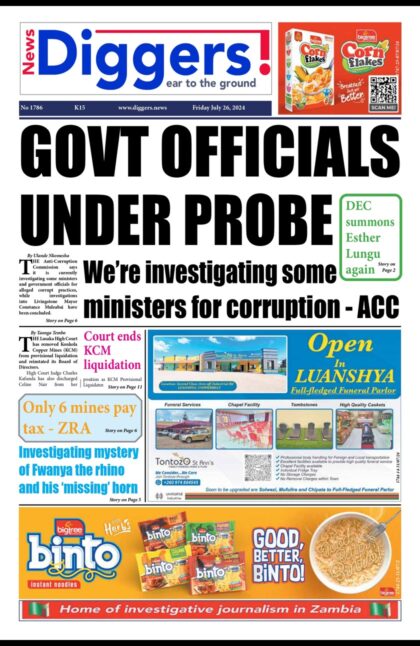FINANCIAL Analyst Mambo Hamaundu says the country’s debt situation is a monster which needs to be dealt with in a precise manner.
And Hamaundu says Zambia is likely to default on the US$750 million 2022 Eurobond payment.
In an interview, Hamaundu wondered why Zambia’s debt levels were still rising amidst implementation of austerity measures.
“The debt situation of course it’s a worrying trend, I think it’s a monster that is in the house, a monster which needs to be dealt with and dealt with a bit more precisely. I think there is a statement from the Minister of Finance and one thing he can be commended on, he has been very honest, he’s actually confirming that our economy is in a bad state and we need to work to try and put it back on the path of economic recovery. And I think it is also important that this issue of debt, we have been with this story for quite a long time, it’s not the first time that it is being spoken of, I think I do recall three years ago, the talk of austerity measures started. We had been told to try and keep expenditure in check, there has been talk to try and not commence new projects, there was talk of skipping projects which are below a certain threshold, and for the minister, from the last time he reported on debt which was around June to end of year, an increase in external debt so the question really is what is happening?” he asked.
“Wouldn’t we have avoided contracting further debt? We need to know why we are accruing more debt when he has actually recognized as a country that the aspect of debt is a big problem and if today we were to be given an opportunity to turn the clock backwards, we go back prior to 2011 as a country, before we borrowed our first Eurobond, I am sure that application of the borrowed money will be far much better so my point being that going forward, we need to identify areas where we can apply money a bit more productively.”
Hamaundu said there was need for government to enhance transparency in order to quell perceptions of corruption.
“So we must learn from the mistakes of the past. It is important and see how we can really move forward having had this opportunity of knowing to say that the way we apply the money we borrow was not necessarily the best way because we put money in roads which basically can be considered to be social roads and of course there have been arguments to say that some of the money was dubiously or there are insinuations of corruption in there so transparency must also be one of the items which we much hold dear because I think it was lack of transparency or it is perceived that there was lack of transparency that’s why we could indeed venture in projects which are not really worth our while for the country in the long run,” he added.
“Because if you are transparent you must put yourself to say this is what I want to do, let the experts evaluate and give comments than it will help you as government to refine your decisions. I think there is no harm in putting your projects or your intentions in public domain. After all, this is public money or a debt which you are acquiring as public debt. So the public ought to know how the loan will be utilized. So this aspect of debt really has put us in a bad position as a country and we need work extremely hard to come out of this debt position.”
And Hamaundu advised Dr Ng’andu to prioritize paying those who would keep money in circulation.
“For me, even as he [the Finance Minister] is grappling with the aspect of dismantling of domestic arrears, it is important that he must also prioritize who he pays, we need to have higher multiplier effect because you can’t dismantle domestic debt by just paying to one person who might just keep the money or pay another person. It’s better you pay people who have a higher multiplier effect where money will exchange more hands. I am looking at the likes of agro dealers, the ones who supply to government, goods and services which are used quite often. Then I think in that way we might be giving the economy a chance to achieve self-recovery. So dismantling of public debt as much as it is good, we must go a step down further to prioritize who we pay because we are looking at the multiplier effect,” he said.
Meanwhile, Hamaundu warned that country may not be able to meet the US$750 million Eurobond in 2022.
“It doesn’t look very feasible, when you go back, there was when we had Minister of Finance Hon Alexander Chikwanda, I think he made a pronouncement in Parliament to the effect that he is establishing a sinking fund and this sinking fund was actually meant to save money so that come 2022 we will not default on Eurobond repayment but if you ask a question now, a couple of years down the line to say how much money do we have in that so called fund, chances are probably that we do not have any money at all. Because I think the last time I heard about it, I can’t remember the figure but there was a very minimal amount which was mentioned by [Margarate] Mwanakatwe. It’s was probably just about four percent of the whole amount needed so it is concerning. Where will this money come from, when you look at our budget at the moment, a significant portion of it is going towards paying salaries of civil servants. Now when you are looking at the lump some payment of US$750 million in one payment. I have my own doubts, as of now the way things are looking, they are not looking that good. I think we simply do not have the money as a country,” said Hamaundu.









One Response
The debt kept rising despite austerity because the austerity measures were not adequate, First, the export revenue targets were not high enough to pay liquidate debts white at the same meeting essential needs of the country. Two, imports could not be drastically downsized as that would create new predictable challenges, including industrial and social unrest. Three, climate change weakened industrial output for even domestic markets to substitute imports and sustain export targets because of electric power deficits. Four, growing FDI could not withstand pressure from contradictory signals by national leaders both inside and outside corridors of power. Take time to attack commercial outlets such as shopping mills. Take time to instrumentation the Republic Constitution.